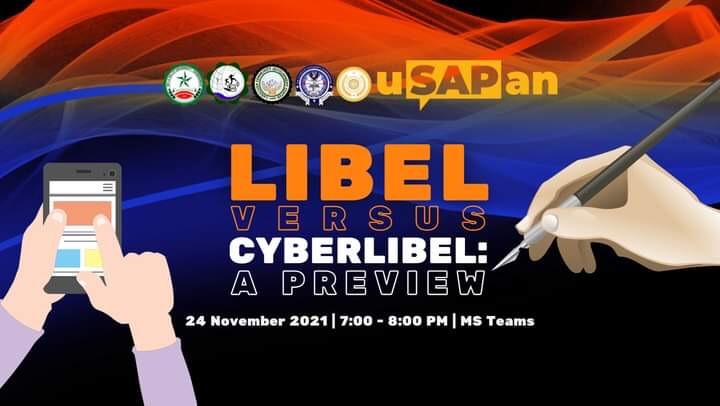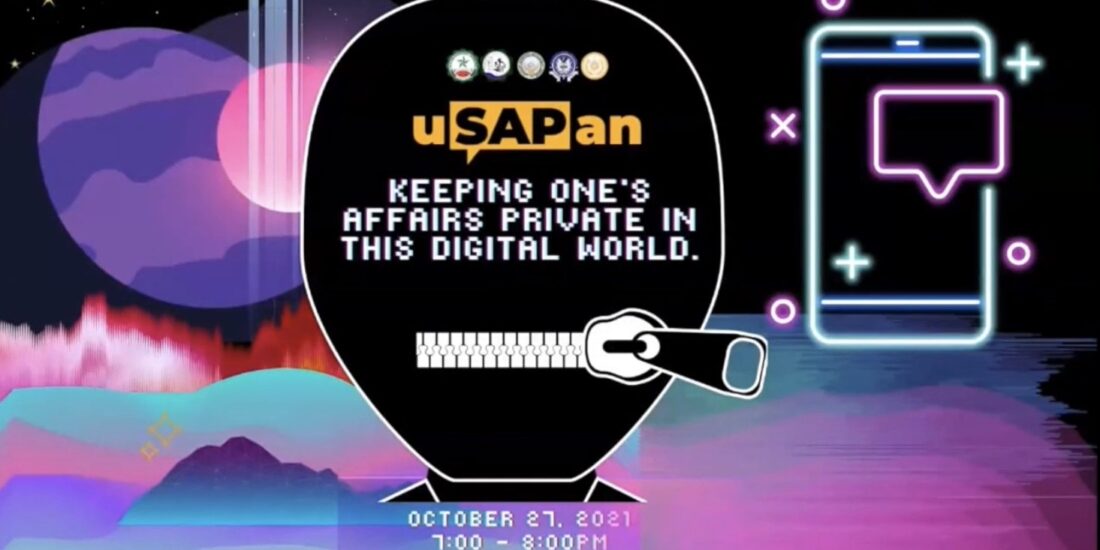The Weight of Words: how uSAPan gets heavy with risks of libel and cyber libel
In a democratic space where every holds the liberty and power to express their views, the Social Sciences Department (SSD), in collaboration with the Lasallian Community Development Center (LCDC), International Development Program Council (IDPC), and Political Science Program Council (PSPC), defined the limits and weight of the words we say, along with the dangers that come when these get out of control.
Featuring DLSU-D alumna and lawyer Atty. Mariko Iwaki as speaker and Airwaves Lyceum Campus Radio President John Mendoza as discussant, SSD’s “The Libel vs. Cyberlibel: A Preview” provided a glimpse of what lies ahead when words turn into intentional lies, or worse: harmful attempts to destroy one’s dignity.
Libel by the book
For some, actions may speak louder than words, but the law tells us otherwise. Highlighting the technicalities of libel, Iwaki explained how someone can get punished for committing the said crime, according to Article 353 under the Revised Penal Code (RPC). For one to be guilty of libel, they must be proven to satisfy all libelous grounds, which include defamatory imputation, publicity of the libelous matter, identification, and established malice.
“You will discover na under the Revised Penal Code, we are following yung principle na mala in se meaning dapat lahat ng elements dun sa crime is present for it to be punishable, so kung hindi siya pasok, walang crime,” Iwaki explained.
As the crime poses confusions to many, the speaker also highlighted the differences between libel, slander, and grave threat – actions that are commonly misconstrued by many people as the same. According to the lawyer, the culture of gossip that tarnishes one’s honor verbally through the spread of rumors or false claims may fall under slander.
Grave threats, on the other hand, are defined as acts that inflict harm and intimidate other people with the intent of imposing fear. “Compared sa libel na paninirang puri, eto, hindi ka lang sinisiraan eh, tinatakot ka niya na may gagawin siya sayo. So that’s how powerful our words can be,” Iwaki said.
A sneak peek of cyber libel
At the time of the pandemic where the battle of ideas happens behind closed doors, many people found new ways and platforms to express themselves. With the advent of advanced technology and wide-reach communication, defamation takes on a new form in the digital world through cyber libel. The Cybercrime Prevention Act of 2012 refers cyberlibel to malicious intent to damage a person’s reputation online, may it be through group conversations, posting status, or any online publication element.
In differentiating the two crimes, Iwaki emphasized the greater penalty that awaits cyber libel cases compared to libel. Based on the new development in the Cybercrime Prevention Act in the RPC, cyber libel comes with a higher degree of offense than traditional libel because defamation is widespread with the use of information and communication technologies.
“It means na, mas mabigat ‘no, mas graver yung penalties na i-impose ng batas natin when we commit libel through cyber, through online means. So, mas natalo pa nung penalty ng mga nag pu-publish sa magazine, sa newspaper, yung pagpopost online,” Iwaki stressed.
Aside from the usual defamatory attacks we see online, guest speaker Mendoza also shared how cyberbullying can turn into libel cases. Even simple jokes with established malice and intent to humiliate can be deemed libelous, depending on the publicity and gravity of harm it caused.
Power of words into great responsibility
As cyberspace turns into a cesspool of trolls, posers, and unidentified attackers, holding these people accountable comes into question — especially for those who are actively participating in public forums, social media sites, and heated discussions.
“We know that na politics man yan or ibang bagay, andaming trolls online, andaming bashers na parang hindi mo mabalikan eh diba kasi di mo naman kilala kung sino sila, paano mo ma-aassert yung right mo?” Iwaki stated.
Drawing knowledge from her profession, the lawyer advised attendees on how to handle libel suits, starting from reporting these instances to the Cybercrime Task Force Office upon encounter. Iwaki also reminded that it is a must to collect all screenshots of the libelous post, and to secure a copy of the Internet Protocol (IP) Address of the offender’s profile for investigation and evaluation of the case. However, filing libel suits does not automatically grant punishment for the accused, as it still depends on the evidence and the power of the court to determine their culpability. In defense, they still hold the right to invoke exemptions if their defenses do not fit the elements and grounds of libel.
“Hindi natin naisip na yung mga nasasabi natin is pwede na po tayong makasuhan or pwede na tayong magkaso […] that goes also as a reminder para satin din pong lahat na we need to be careful,” Iwako emphasized.
***
What comes out from our mouth has the ability to create an impact and the strength to destroy others on a whim. Holding the power and responsibility of heavy words as democratic citizens, freedom of speech is not an open invitation to walk over other people’s reputations. While calls for decriminalizing libel bears a significant weight, knowing the limits of our words and freedom also holds the same gravity.
Slider Courtesy of Social Sciences Department.



